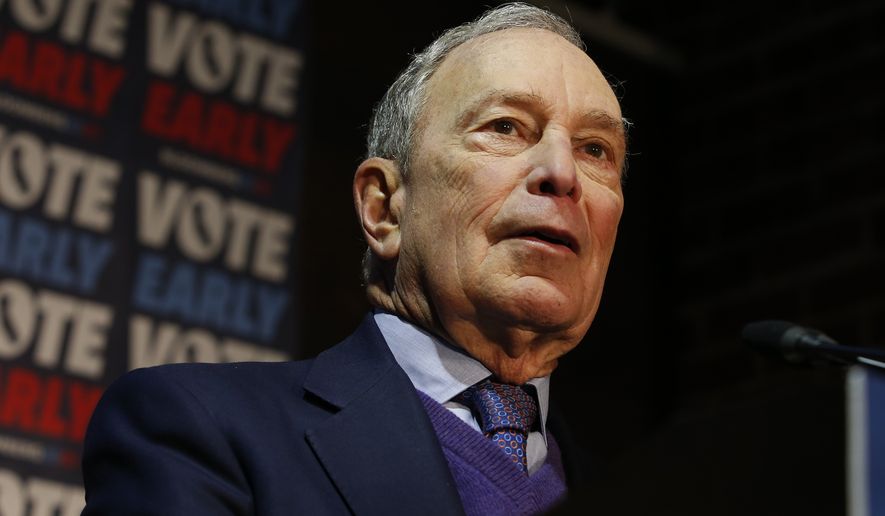Michael R. Bloomberg forged a campaign juggernaut by breaking all the usual rules, shunning retail politics and ignoring the first primary-season contests. He has yet to collect a single convention delegate.
Democratic Party voters across the political spectrum have embraced him anyway, virtually sight-unseen.
On Wednesday they got their first close-up look as the billionaire former mayor of New York faced off against his chief rivals in a debate in Las Vegas, where he insisted he’s more than the sum of his massive bank accounts.
“I’m a New Yorker. I know how to take on an arrogant con man,” said Mr. Bloomberg, who ignored opponents’ complaints about his record and argued voters need look only at electability in the battle against President Trump.
“I think we have two questions to face tonight — one is who can beat Donald Trump, and No. 2, who can do the job if they get into the White House. I would argue I am the candidate,” he said.
Whatever his credentials, he is the most interesting politician in the world right now.
Opposition researchers are working overtime to reveal his checkered political past, odds-makers are revising their listings, the rest of the Democratic field is trying to figure out lines of attack — and Democratic primary voters are rushing to back him.
In the last month Mr. Bloomberg has more than doubled his support in the national polls, rising from 7% support to 16.1%, according to the Real Clear Politics average. That’s good enough for third, and he’s nipping at former Vice President Joseph R. Biden’s second-place standing.
He’s gained nearly across the Democratic spectrum, with far-left voters the only demographic that hasn’t moved toward him, according to Emerson College Polling, which shows him with 14% support, double what he had in the same poll last month.
“He seems to have support across demographics, and there might be another variable in play that voters are looking at, and that could be somewhere between electability to voter expectations about the candidate,” said Spencer Kimball, Emerson’s poll director.
SurveyUSA, another polling firm, showed Mr. Bloomberg at 18% support, tied with Mr. Biden, and drawing backing particularly from black voters, those at the lower income level and those ages 50-64. He’s also more than tripled his support in the Midwest — which was supposed to be the stronghold for Sen. Amy Klobuchar and former South Bend, Indiana, Mayor Pete Buttigieg.
Mr. Bloomberg’s rise among Democrats is all the more striking because of his own tenuous ties to the party.
He began as a registered Democrat but abandoned the party to run as a Republican for New York mayor, winning in 2001 and 2005. He then abandoned the GOP and became an independent ahead of his third mayoral win.
He finally returned to the Democratic fold in late 2018, as he eyed the presidential race.
Mr. Bloomberg’s campaign this week argued he’s the only viable alternative for those afraid of nominating Mr. Sanders. Otherwise, with the field as it is now, Mr. Sanders would emerge from the March 3 Super Tuesday primaries with the race essentially won.
“The bottom line is that if Biden, Buttigieg and Klobuchar remain in the race despite having no path to appreciably collecting delegates on Super Tuesday (and beyond), they will propel Sanders to a seemingly insurmountable delegate lead by siphoning votes away from MRB with no upside for themselves,” his campaign team wrote.
The call for others to drop out was stunning, particularly for a candidate who has yet to win a single delegate, and whose name doesn’t even appear on the ballots in the upcoming Nevada caucuses and South Carolina primary.
“This is now a three-candidate race between MRB, Sanders and Trump,” the campaign claimed.
The memo enraged his fellow candidates.
Ms. Klobuchar said it struck her as a man telling a woman to wait her turn. Mr. Buttigieg said the choice of Mr. Sanders and Mr. Bloomberg was a disaster.
“We shouldn’t have to choose between one candidate who wants to burn this party down, and another who wants to buy this party out,” he said.
Oddsmakers do see plenty of movement behind Mr. Bloomberg.
Bovada, which offers political bets, on Wednesday listed Mr. Bloomberg at +200 odds, trailing only Mr. Sanders at +125. According to those odds, someone who bet $100 on Mr. Bloomberg stands to collect an additional $200 should be win the nomination.
Mr. Biden, who a month ago was the favorite at +175 odds, is now far behind at +775.
Some pundits have accused Mr. Bloomberg of attempting to buy the nomination, but Mr. Kimball said Mr. Bloomberg’s rise isn’t just money. If cash were king, then Tom Steyer, another billionaire who has spent freely, would be doing better than his 2.4% average at Real Clear Politics.
What Mr. Bloomberg has been able to do, though, is control what potential primary voters know about him by avoiding traditional politicking, skipping the early states where personal contact is required, and instead introducing himself by television to states where no retail politicking is expected.
“Bloomberg right now is idealized as a candidate,” Mr. Kimball said Wednesday afternoon, speaking before the Las Vegas showdown. “Tonight’s debate is going to make him more of a real candidate.”
Justice Democrats, a liberal advocacy group, said if primary voters hear about Mr. Bloomberg’s past quotes and positions, they’ll quickly sour on him.
The group released polling data showing the former mayor’s approval rating drops when Democrats voters are told of Mr. Bloomberg’s wealth, his history as a Republican, and his support for “stop-and-frisk” policing tactics.
“The results here show how vulnerable Bloomberg is to negative messaging,” said Sean McElwee of Data for Progress.
• Stephen Dinan can be reached at sdinan@washingtontimes.com.




Please read our comment policy before commenting.